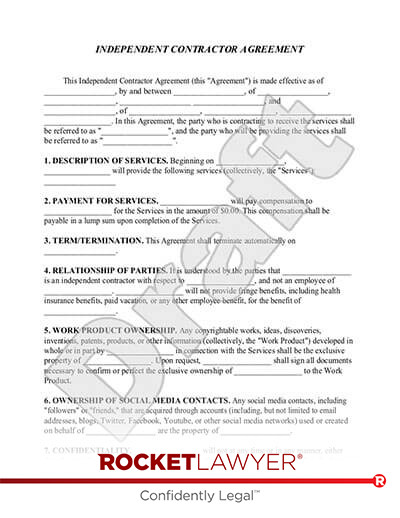Is it legal to hire independent contractors for your workforce?
Maybe. Independent contractors may not be able to do everything. There are situations, where you will be legally required to hire employees rather than independent contractors. The requirement varies based on your industry and what your workers actually do for the business, more so than how they are paid. Though, as the name suggests, using independent contractors will require creating contracts for their projects or work.
Independent contractors have more freedom and can often set their own hours, and work how they want to work within the bounds of industry standards. They may be given a project and asked to complete it by a certain deadline with little, if any, direction or oversight by a supervisor. It's common for bookkeepers, attorneys, trade workers, or consultants to work as independent contractors, but usually a violation of labor laws for hourly workers who do the regular everyday work of the business, such as serving customers. Frequently, staffing agencies can help employers by providing legal short- and long-term solutions at predictable rates, and at a fraction of the paperwork.
Employers like independent contractor relationships because they are easier to track and pay. Employers do not have to worry about withholding tax obligations, providing benefits, or covering other employment costs. Unfortunately for employers, not every worker can be an independent contractor, and misclassification mistakes can be rather costly.
When is it legally required to hire an employee rather than an independent contractor?
Even if you call someone an independent contractor, you may still be required to classify and pay them as an employee. The Internal Revenue Service (IRS) has issued guidance about who should be classified as an independent contractor and who should be an employee. Many states rely on IRS guidance for their own laws and regulations.
In general, the more control the employer exerts, the more likely a worker should actually be hired as an employee. If the worker is doing the work that the business is primarily engaged in, then it is unlikely that the worker can be classified as an independent contractor. For example, a burger stand would need to hire cooks as employees because those workers are doing the work that the business primarily engages in. If that same burger stand, however, needed landscaping work, a landscaper could be hired as an independent contractor because burger stands are not primarily engaged in the landscaping business.
The following factors may be considered for classification purposes, though the final determination will generally take several of these factors into consideration:
- Does the worker use their own supplies or tools?
- Is the worker paid by the hour or by the project?
- Can the worker have more than one employer or client?
- Whether there is a risk for the worker to sustain a monetary loss.
- Does the business provide any benefits to the worker?
- How long the relationship has lasted or is expected to last.
- Are the services performed key aspects of the business?
- Whether the worker has unreimbursed business expenses.
- Did the Employment Offer Letter set out expectations in line with the classification.
If there is an Independent Contractor Agreement for a specific one-off project, for example, the worker is more likely to be an independent contractor rather than an employee, but that one factor alone is not determinative. You can also specifically set out that a worker is considered an employee as part of their Employment Contract. But just calling a worker an independent contractor does not mean that they will be classified as one if it gets challenged in a labor complaint.
If a business only hires independent contractors, when is it required to make those contractors employees?
There is no hard and fast rule about when you need to make independent contractors employees. Instead, you need to review the relationship with each worker. Reviewing the list of factors above can help, however, to be sure, businesses should ask a lawyer.
For example, if you plan to control when and how a person works, with no expected end date to the relationship, that person may need to be classified as an employee rather than an independent contractor. This is usually the case if you hire a worker to do the work your business offers to its customers.
What are the consequences of employee misclassification?
The consequences of misclassifying workers can be severe. Consequences can include:
- Legal liability for unpaid wages, benefits, and penalties.
- Tax penalties, fees, and interest.
- Penalties for failure to pay unemployment insurance.
- Penalties for failure to pay workers' compensation.
The penalties are not exclusive. State and federal authorities can issue penalties for the same instance of misclassification. Additionally, workers may file misclassification claims seeking compensation after finishing the work and being paid as set out in their Independent Contractor Agreement.
Can I hire an independent contractor who was misclassified as an employee without facing liability?
This depends on whether the contractor files a complaint in court or with a state labor department. If an investigation into your classification practices has already started, hiring the worker as an employee may not help you avoid past liability and penalties. Taking corrective action, however, may reduce penalties levied by the authorities, and stop the monetary damages from growing larger.
As a rule, you should take a hard look at any independent contractor relationship you have on a regular basis to ensure that you are classifying and paying that worker correctly. To learn more about whether your independent contractors should be employees, contact a Rocket Lawyer network attorney to get your legal questions answered.
This article contains general legal information and does not contain legal advice. Rocket Lawyer is not a law firm or a substitute for an attorney or law firm. The law is complex and changes often. For legal advice, please ask a lawyer.
